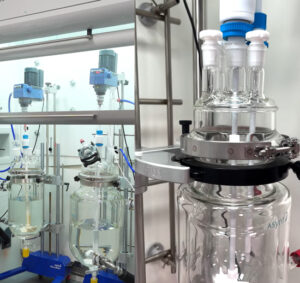A Case Study with Almac Sciences
Richard Ward, Principal Chemist at Almac Sciences with the Asynt ReactoMate ATOM lab reactors and Julabo temperature control solutions.
Asynt, a renowned provider of laboratory equipment, has collaborated with Almac Sciences, a leading specialist in API development and manufacturing, to design and supply a range of bespoke reactor vessels. This case study showcases the successful partnership between the two companies, highlighting the benefits of utilizing Asynt’s lab vessels to streamline Almac Sciences’ scale-up process.
Almac Sciences, a member of the Almac Group, has established itself as a trusted provider of integrated services for the development of advanced intermediates and Active Pharmaceutical Ingredients (API). With over 50 years of experience, Almac Sciences has built a strong reputation for its technical expertise, extensive facilities, and innovative solutions.
Streamlining Scale-Up with Asynt’s Lab Reactors:
Recognising the importance of efficient scale-up processes, Almac Sciences initially engaged with Asynt to procure benchtop scale lab reactors ranging from 250 mL to 1,000 mL. These reactors were designed to closely mimic Almac Sciences’ larger plant vessels, enabling seamless transition to large scale manufacturing.
Richard Ward, Principal Chemist at Almac Sciences, explains,
“The small-scale bespoke lab reactors designed and supplied by Asynt, combined with our modelling software, allow us to simulate and validate our processes before scaling up to our manufacturing plant. This collaborative approach not only saves time and costs but also enhances confidence in the manufacturing success of the scaled-up processes.”
Expanding Capabilities with Larger Bespoke Lab Vessels:
Based on the successful partnership and the need to support their expansion plans, Almac Sciences turned to Asynt for the procurement of larger bespoke lab vessels, ranging from 10 to 20 L. These vessels have enabled Almac Sciences to conduct scale-up reactions on hundreds of gram scales before initiating plant manufacturing.
Richard elaborates,
“The larger bespoke lab vessels supplied by Asynt allow us to perform a wide range of chemistries, including recrystallizations and handling air/moisture-sensitive organo-metallic reagents. By utilizing the combination of Asynt vessels and Julabo temperature control units, we can model and refine processes prior to scale-up, ultimately producing materials at a larger scale in our labs.”
Enhancing Safety and Ease of Use:
To further optimize their laboratory operations, Almac Sciences chose Asynt’s ReactoMate ATOM stands to support their larger lab vessels (5, 10, and 20 L). This user-friendly system enables easy adjustment of vessel height, providing enhanced safety and convenience during the charging of solids. The vessel can be easily raised to a normal operating height afterward, requiring minimal effort from the operator.
Conclusion:
The collaboration between Asynt and Almac Sciences has proven to be instrumental in optimizing API development and manufacturing processes. By leveraging Asynt’s range of bespoke lab vessels, Almac Sciences has achieved significant advancements in process simulation, validation, and scale-up. The integration of Asynt’s vessels with Julabo temperature control units has enabled Almac Sciences to confidently produce larger quantities of non-GMP materials while saving time and costs. Moreover, the adoption of Asynt’s ReactoMate ATOM stands has enhanced safety and ease of use in the laboratory.
Interested in finding out more?
For more information on how Asynt’s bespoke lab vessels and support stands can support API development and manufacturing, please visit www.asynt.com/products/jacketed-lab-reactors/ or contact Asynt at +44-1638-781709 or [email protected].
Download this PR and Case study in PDF format HERE.
Faciliter le développement et la fabrication des IPA grâce aux récipients sur mesure Asynt
Die maßgeschneiderten Laborgefäße von Asynt erleichtern Entwicklung und Herstellung von APIs
Faciliter le développement et la fabrication des IPA grâce aux récipients sur mesure Asynt





